Mushroom Mania: The Rise of
Mycelium-Based Products in F&B
From fungi-based bacon to biodegradable packaging, mycelium is emerging as one of the most transformative materials in the global food system and far beyond.
15 July 2025
Share this exclusive content from Saladplate
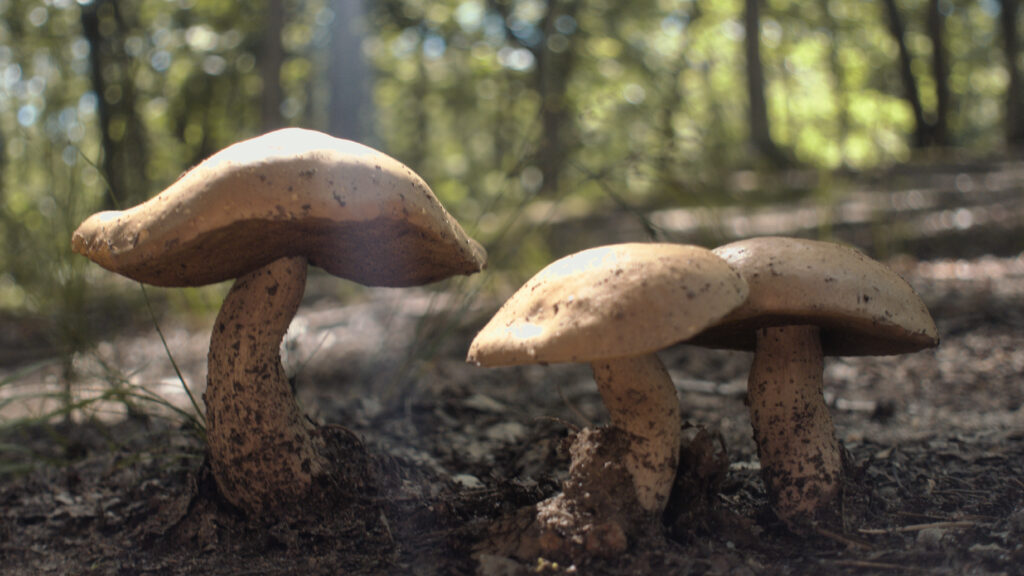
Trio of Mushrooms in the Wild | Photo Credit: Savidge Michael
In recent years, mushrooms have moved well beyond the salad bar. Today, they are at the heart of a quiet revolution reshaping everything from how we eat and drink to how we package the products we consume. At the centre of this shift is mycelium, the intricate underground root system of fungi, long overlooked and now at the forefront of sustainable innovation.
Fuelled by consumer demand for clean-label ingredients, plant-based alternatives, and plastic-free solutions, the humble mushroom has emerged at the forefront of a new wave of innovation. No longer niche, mycelium-based innovations are being championed by startups, scientists, and sustainability advocates across the globe.
A Living Materials with Limitless Potential
Mycelium is nature’s recycler, a living network capable of breaking down organic material, absorbing nutrients, and regenerating ecosystems. But its potential goes far beyond the forest floor. In the hands of food tech pioneers, it’s becoming a raw material for high-protein meat alternatives, adaptogenic drinks, and even compostable packaging strong enough to replace styrofoam.
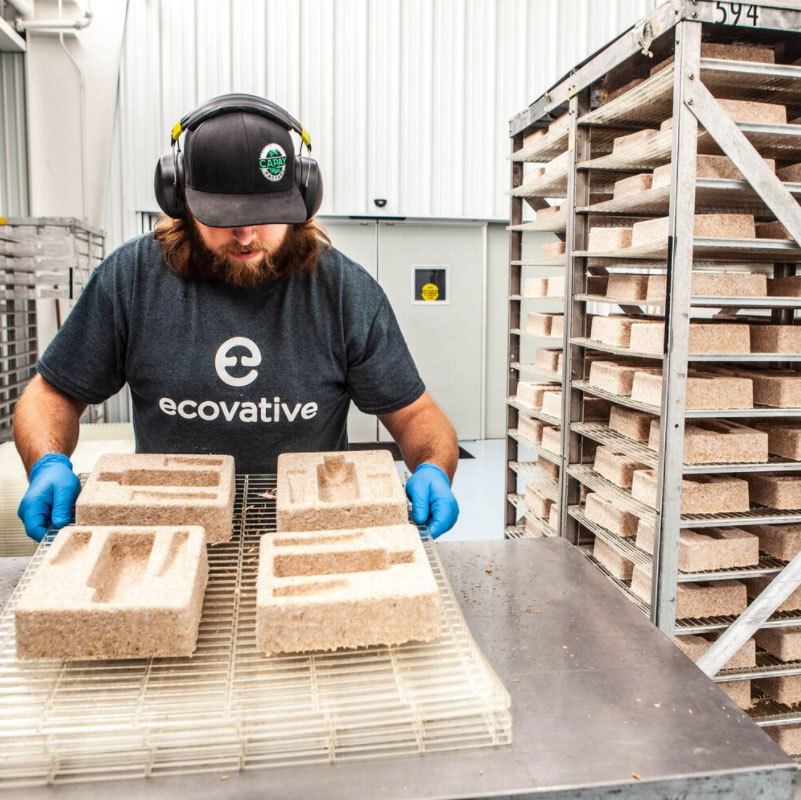
Innovative Mushroom-Based Packaging | Photo credit: Ecovative
“Mycelium is one of the most versatile biomaterials we’ve discovered,” says Eben Bayer, CEO and co-founder of Ecovative, a U.S.-based leader in mycelium technology. “It’s renewable, compostable, and can be grown in a matter of days, not years. That speed and sustainability make it ideal for everything from packaging to food.”
Founded in 2007 by Bayer and Gavin McIntyre, Ecovative was among the first companies to commercialise mycelium-based packaging, working with major brands like Dell and IKEA to replace petroleum-based foams with biodegradable alternatives. Today, the company is scaling up production with a state-of-the-art mycelium foundry and expanding into food products and textiles, while pushing the boundaries of what fungi can do.
Reinventing the Plate, One Fungi at a Time
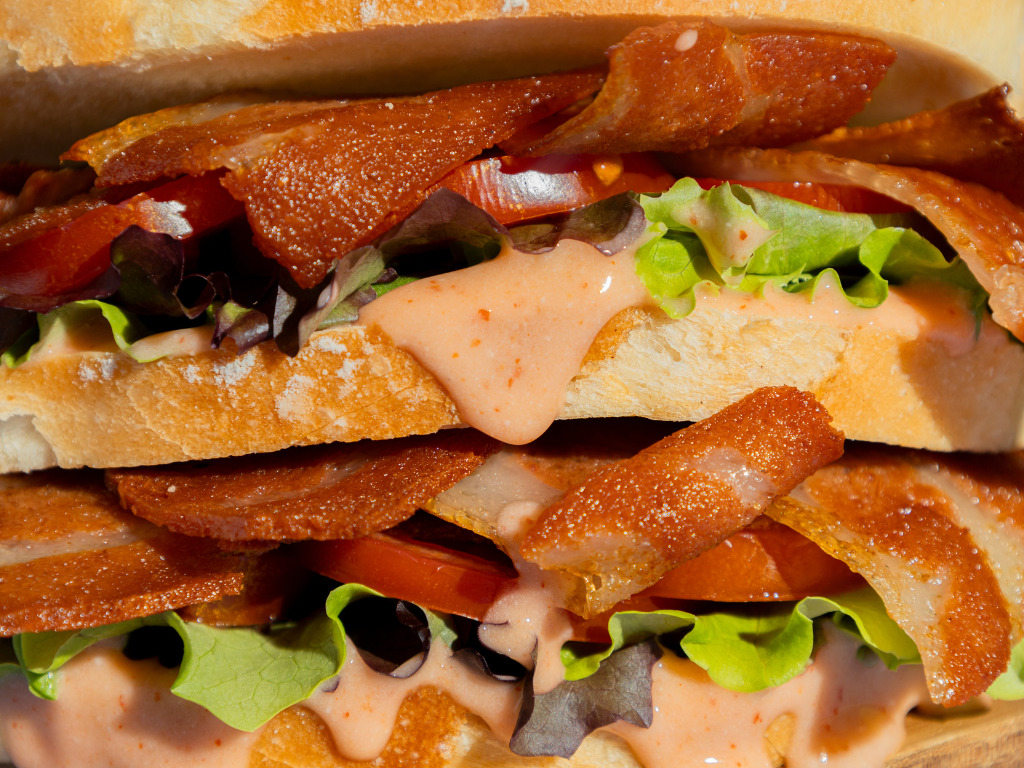
Fungi-based Bacon | Photo credit: Libre Foods
In Europe, the food landscape is being redefined by startups like Libre Foods in Barcelona, which debuted its first fungi-based bacon in 2023. Their goal is to reinvent meat, not with soy or peas, but with fungi. Months later, the company teased a whole-cut chicken breast made from mycelium, the root-like structure of filamentous fungi.
“From the beginning, we’ve been fascinated with fungi’s one-of-a-kind potential to reinvent our food system,” says founder Alan Iván Ramos. “Mycelium allows us to create textures and flavours that feel incredibly close to traditional meat, without the environmental cost.”
In June 2025, Libre Foods announced its acquisition by Swiss fermentation manufacturer Planetary. Ramos explains: We realised that access to advanced manufacturing was essential for scaling our technology and making a commercial impact. Partnering with Planetary, which operates the only active industrial mycoprotein facility in continental Europe and is developing the BioBlocks biomass and precision fermentation platform, was the most effective way forward.”
Planetary plans to integrate Libre’s fermentation and AI capabilities with its manufacturing infrastructure, expanding its fungi-based product offerings and accelerating the industrialisation of sustainable fungal proteins across Europe.
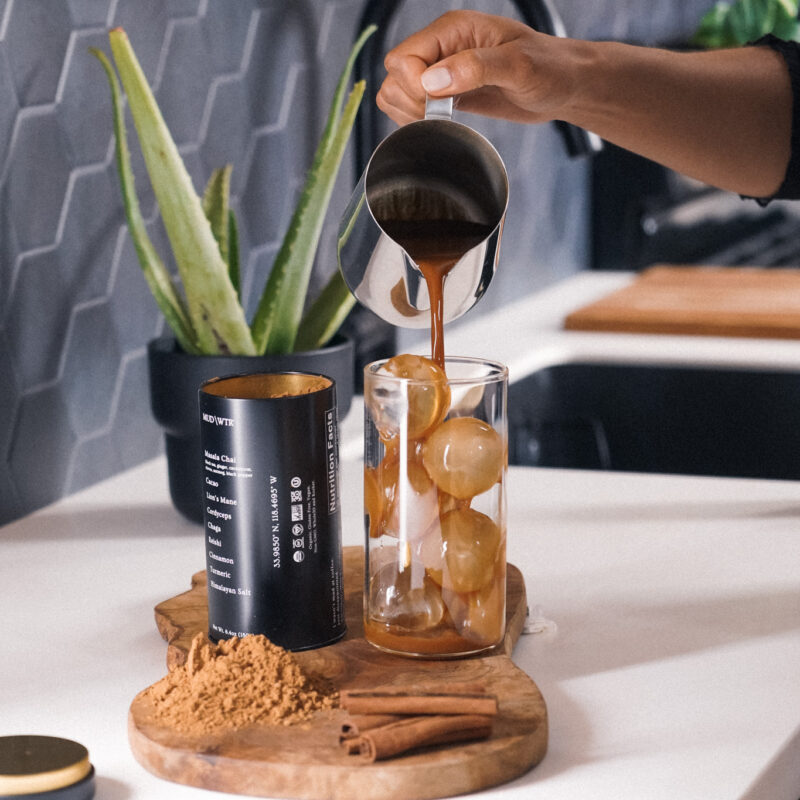
Mushroom Coffee Blend | Photo: MUD/WTR
Across the Atlantic, California-based MUD/WTR is redefining morning rituals with its innovative mushroom coffee blend. Unlike traditional coffee, which relies heavily on caffeine, MUD/WTR combines medicinal mushroom extracts including lion’s mane, chaga, reishi, and cordyceps, with cacao and masala chai spices to create a beverage that supports sustained energy, mental clarity, and immune health without the jitters or crash.
Packed with 100% organic ingredients, prebiotic fibre, and calming L-theanine, MUD/WTR contains only 35mg of caffeine per serving, far less than a typical cup of coffee. This carefully crafted blend delivers “calm energy” that fuels focus while being gentle on the nervous system, making it an attractive choice for health-conscious consumers seeking functional beverages beyond the usual caffeine fix.
Beyond culinary innovation, mycelium’s potential is reshaping how we think about sustainability across the entire food ecosystem.
Packaging with a Purpose
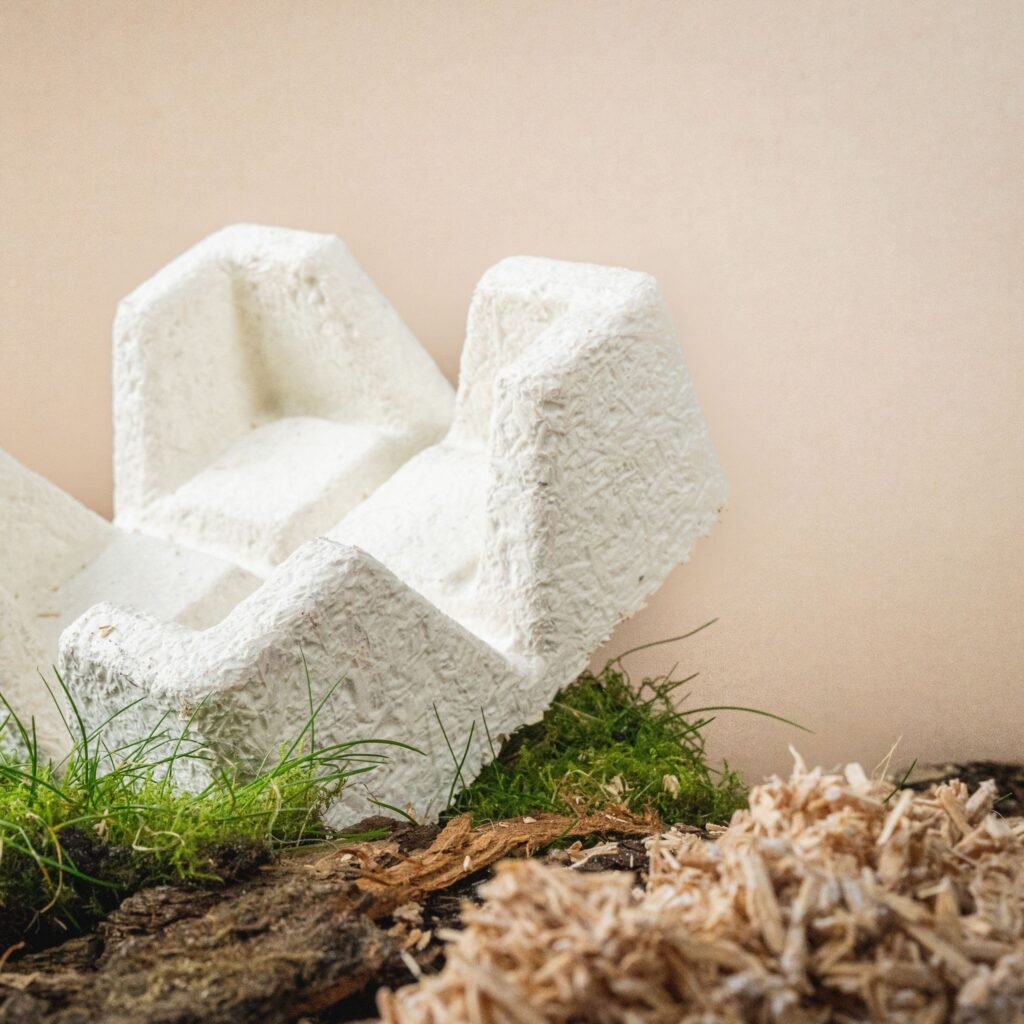
Mycelium-based Packaging | Photo credit: Grown bio
As the food industry grapples with the plastic problem, mycelium is also proving to be a game-changer in sustainable packaging. Lightweight, durable, and fully compostable, mycelium-based packaging is gaining traction as a scalable solution to petroleum-based foams and single-use plastics.
In the Netherlands, Grown bio, a mycelium packaging startup founded in 2018 by entrepreneur Jan Berbee, is leading the charge. Berbee launched the company to create a more sustainable solution for industries relying heavily on plastic foam, such as fish transportation. Grown bio’s large mycelium coolers, priced at around 10 euros each, offer 95% of the insulation capabilities of Styrofoam but with the critical advantage of being biodegradable.
The company has attracted interest from across Europe and beyond: a Norwegian firm has trialled Grown bio coolers for salmon transport, and discussions are underway with a major Hamburg-based fish exporter shipping products to Asia. These developments highlight the growing demand for packaging that protects perishable goods while minimising environmental impact.
Why Mushrooms Matter More Than Ever
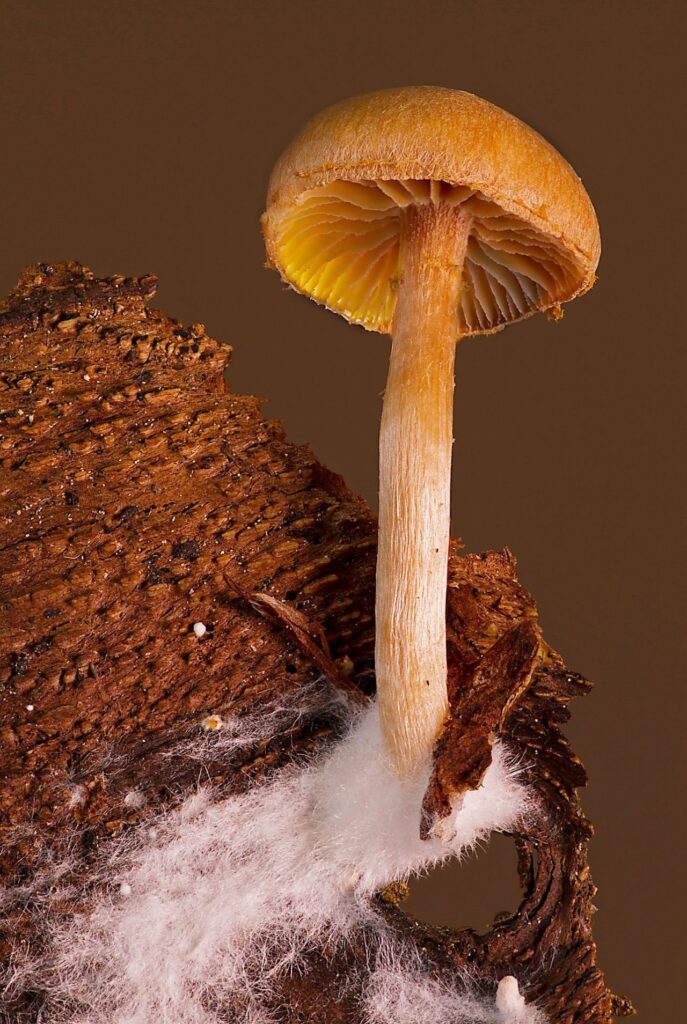
Wild Fungi | Photo credit: Grown bio
As biodiversity loss, soil depletion, and resource scarcity challenge traditional agriculture, fungi offer an alternative model rooted in regeneration. Mycelium can grow on agricultural waste, requires minimal water, and produces zero toxic byproducts. It’s a material of the future, rooted in ancient biology.
What’s Next?
As research accelerates and funding flows into fungi-focused startups, expect to see more mycelium-based products on the shelf and on the plate. Whether it’s a juicy burger grown from roots, or a takeaway box that composts in your garden, mushrooms are making their way into everyday life in powerful, unexpected ways.
In the era of climate crisis and conscious consumption, mushroom mania is more than a trend, it’s a movement. One that’s helping the global food industry reimagine its future, from the ground up.
Author: Michelle Yee
A content and communications professional, Michelle spent more than a decade creating content for several leading media titles including Lonely Planet Asia, Yahoo Singapore, and Wine & Dine. After leaving the media industry in 2019, she has been honing her craft at a global communications agency where she helps develop and drive publicity campaigns for brands in the consumer and corporate sectors.



